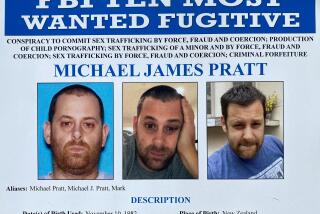Cleaning Up His Act
- Share via
PORTLAND, Ore. — Ruben Patterson awoke one day just before the start of the NBA season feeling sick and tired. Again. Hangovers were just as much a part of his routine as practice.
But that day was to be unlike others. Patterson decided he’d had enough of alcohol.
Concerned about his legacy as a player, a father and a man, Patterson resolved to eliminate the demon that had dogged him since he was a teenager.
Over the past decade, Patterson’s career as an NBA forward probably could best be characterized as mediocre. A second-round draft pick by the Lakers in 1998, he primarily has been used off the bench. He is better known for off-court incidents, including the attempted rape of his children’s nanny.
“I got to the point where I was so tired, I was like, man, I’ve got to stop,” he said. “So then and there I said to myself, ‘I’m stopping.’ And I haven’t had any since.”
It remains to be seen whether Patterson indeed has turned his troubled life around, but his play is one of the few positives in the Portland Trail Blazers’ bleak season. One newspaper columnist said Patterson, while not the team’s highest scorer, should nonetheless be considered its MVP.
Former Blazer Darnell Valentine, the team’s director of player programs, is in charge of providing players with support on and off the court as part of a management pledge to Portland fans.
“Ruben was able to wake up. He had that kind of determination. He saw where his life was going, and what his legacy was going to be, and he changed it,” said Valentine, previously a regional representative for the NBA players association. “He has that kind of willpower.”
Patterson’s transformation has come during a season when the once-proud franchise has had its first losing record since 1988-89. The Blazers will miss the NBA playoffs for the second straight season, after 21 consecutive years in the postseason.
This season has not been entirely smooth for Patterson, either.
Patterson came to training camp demanding a trade because of a perceived verbal slight made by General Manager John Nash during the summer. But he steadily played and practiced his way to more minutes. When forwards Zach Randolph, Darius Miles and Shareef Abdur-Rahim all struggled with injuries, Patterson got his chance.
Then, the team fired coach Maurice Cheeks last month, handing over the job on an interim basis to Kevin Pritchard, the team’s director for player personnel. Although Portland was not mathematically eliminated from the playoffs at the time, Pritchard all but conceded the season was lost and proclaimed the team would shift its focus toward evaluating new talent.
Patterson acknowledges he did not react well to the news, and he landed on the injured list with right knee tendinitis and missed 11 games. Now back, Patterson said he spent the time in Ohio resting with his kids, and in retrospect says he probably shouldn’t have missed so many games.
Despite the recent stint on the injured list -- which led to questions about the severity of the injury and whether it was partly a protest against Cheeks’ firing -- Patterson has made a case for a future in Portland. Abdur-Rahim becomes a free agent and is likely gone, freeing up a spot for Patterson at forward with Randolph. Miles, who signed a six-year deal with the Blazers last off-season, has not played with the same intensity as Patterson.
“He plays as hard as anybody in the NBA,” Pritchard said. “Anytime he’s on the bench and I look down there and see him, I gravitate toward putting him in. I’d go to war with him for 82 games.”
Valentine believes Patterson’s sobriety is the reason he has been successful.
“There’s just no way, as talented as these players are, that they can reach their full potential by doing those kinds of detrimental things off the floor. If you truly want to be great, it’s the whole package,” he said.
Still, Patterson’s troubled past haunts him.
In 2001, he entered a modified guilty plea in Washington state to third-degree attempted rape for allegedly forcing his children’s 24-year-old nanny to perform a sex act on him. A judge suspended all but 15 days of a one-year sentence, and Patterson served the time in his Cleveland home. He also was suspended for the first five games of the following season by the NBA, and had to register as a sex offender in Oregon.
Patterson was convicted of misdemeanor assault in February 2001 for attacking a man who scratched his car outside a Cleveland night club.
He was signed by the Blazers in August 2001 to a six-year deal worth $33.8 million.
But his troubles continued in November 2002 when he was arrested on felony charges of domestic abuse against his wife. Shannon Patterson later dropped the abuse charges, but the couple’s marriage was shattered and they divorced.
Patterson said he realized that, with his behavior, his children were seeing the same trouble he had seen during his youth. His father struggled with drug addition and spent time in prison.
“Growing up as a kid I went through a lot, family-wise. Mother, father, just family, period. Seeing all that affected me. Once I grew up and was older, 22, 23, I was making a lot of mistakes too,” he said.
“I wanted to see my kids -- when they grow up -- to be good, successful. That’s another reason I made my change. I don’t want my kids to go through all the trouble I went through.”
He’s forging a new relationship with his ex-wife, whom he calls his best friend. They’re working on a reconciliation, he said. Sobriety made it happen.
“That changes a lot. Because, you know, alcohol makes you mean, want to fight and grumpy all the time,” he said.
Patterson says he has many regrets when it comes to his drinking, and wishes he had stopped earlier. Perhaps his career and his life would have taken a different path.
“As far as what happened in my past? It has a lot to do with drinking,” he said, shaking his head. “Yeah. Definitely.”
More to Read
All things Lakers, all the time.
Get all the Lakers news you need in Dan Woike's weekly newsletter.
You may occasionally receive promotional content from the Los Angeles Times.







